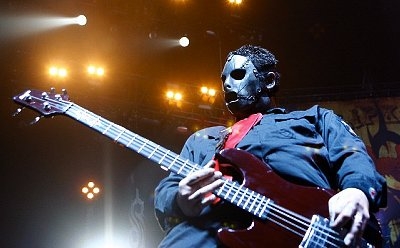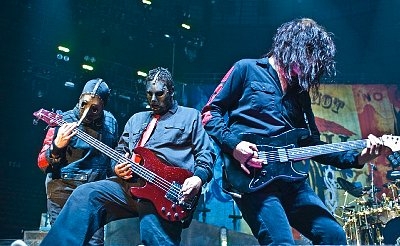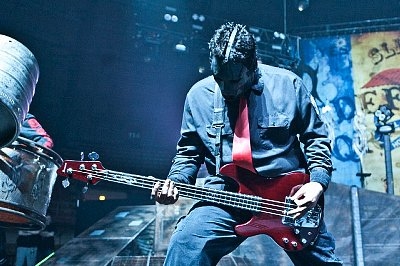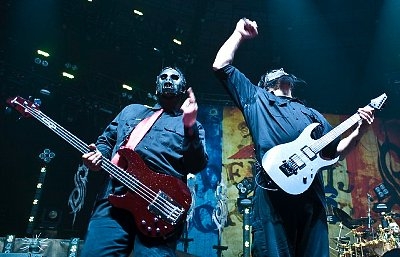Previously-unpublished Paul Gray (Slipknot) interview
Paul Gray 1972 - 2010
As a standing tribute to the late Paul Gray, TG presents this never-before published interview with the Slipknot bassist.
Recorded at Download 2009, Paul talked to TG about his solid playing style, his reason for being a bass player and his tips for making you play better. Total Guitar has not edited this interview, deciding instead to leave as much of Paul's personality and character in as possible… RIP Paul.

© Scott D. Smith/Retna ./Retna Ltd./Corbis
How long have you been playing bass guitar for, Paul, and why did you choose bass as your main instrument?
"I think I started playing bass in 1990, which is what? 19 years ago… Wow, I'm getting old! Actually I played guitar first - hang on, my sunglasses are totally fucking up here - I played guitar first and never picked up a bass, wasn't interested in it at all. Then I moved to Iowa and I didn't have any friends there, I didn't know anybody, and I was in this music store and I overheard this dude talking about needing a bass player…
"I was listening in on their conversation, eavesdropping, they were talking about doing covers of Slayer and Metallica - all these songs that I knew how to play on guitar. So I was like, I've moved to Iowa, I don't know anybody, so maybe I should jump in and say I play bass and try to meet some people? So I went over and said, 'Dude, I play bass' even though I didn't have a bass guitar and never picked one up. I figured that it couldn't be that different to playing guitar, but later on I found out it's a totally different thing.
"It was weird because when I started practising these songs on bass, I didn't know any of them. I knew the guitar lines and could have jammed those, but the bass parts were totally different and I was like, 'Fuck!' I had to go back and listen to them. Doing that actually made me fall in love with bass guitar and that's why I became a bass player."
Want all the hottest music and gear news, reviews, deals, features and more, direct to your inbox? Sign up here.
Do you remember what your first bass guitar was?
"You know, the first one I bought was a Charvel, a weird reddish purple Charvel… It was not that great a bass. But the first bass I used to try out for this band, because I didn't have a bass and I'm left-handed, was some no-name bass but kind of like a double cutaway so it kind of looked like an SG maybe? So I switched the strings on it and it kind of looked OK, like a left-handed bass if they'd put the knobs on the top. When I tried out I constantly turned myself down or turned the tone knob down by accident.
"After that the first real bass I bought was an Ibanez Soundgear and I still play Ibanez now. But in the beginning, after we got our record deal, I went to Warwick actually. They were the first company to give me a deal and Warwick basses are great - I'll never talk crap about Warwick because they're amazing basses and an amazing company too and super great guys.
"We were on Ozzfest and I had the one Soundgear bass, which was really old, with no back-up guitar and we were playing all these shows. If that bass went down that was it. After the third or fourth show I met somebody from Warwick and they sent me out a Corvette or some model and it was awesome. They gave me a full deal and they treated me really good, which was great because we had no money at that time and I couldn't afford anything.
"But then I ended up going to Ibanez on the last album because - I can't remember where we were - but I went to a pawn shop and picked up this Ibanez ATK that they've stopped making and I just loved the way it played and sounded, so I started playing it too and Ibanez approached me to offer me a deal. They started sending me Soundgears but I didn't want to play them and I said, 'If you start making these ATK's again like this one, I'll switch companies'. I didn't think they would, but they called me up and said, 'Here you go!'"

© J. Dennis Thomas ./Retna Ltd./Corbis
What about amps?
"I started with Ampeg but now I'm with Peavey. Ampeg was also really great to me and I can't say anything bad about them. During the third Slipknot record I met Dave Ellefson from Megadeth and he said, 'Try this out man' so I played through his Peavey amp.
Peavey has been amazing to me and because they have worldwide distribution it makes it easier for me when touring. I'm able to leave gear at home, and that was the same with Ibanez. Warwick was an awesome company but they were a small company and it was more difficult to get stuff on the road if I needed it. Ibanez and Peavey have somebody everywhere."
What was the first bassline you ever tried to play?
"Actually it was some Sabbath and Metallica stuff. Cliff Burton was awesome and since we were doing Metallica covers, I really had to sit down and learn Cliff's parts because he was all over the place. I was used to hearing the guitar in each song and the bass is there and you can hear it filling out the song, but I really had to listen to his parts. The bass fills he did, I really had to fucking rewind tapes and play them over and over to get it."
Did you ever take lessons in bass guitar?
"I took a few bass lessons to learn slap and pop techniques, because once I really got into bass I started listening to everything - not just metal and rock. I listened to Chili Peppers, lots of funk and jazz players… Lots of Bootsy Collins stuff, so I tried to learn as much as I could. There was a band in our town that had a great bass player called Mark and he could play jazz and funk, so I sat down with him about five or six times and learned a lot of techniques. Everything else has been me just experimenting."

© J. Dennis Thomas ./Retna Ltd./Corbis
You've mentioned quite a few genres there, so what's your favourite bassline of all time?
"You know what, some of my favourite basslines are the simplest ones ever. It's weird but I love the bassline in Van Halen's 'Running With The Devil' in open fucking E. Now, I appreciate any player who can lay down a solid bass groove, like Cliff Williams from AC/DC. Or Maiden's Steve Harris, who does all kinds of amazing stuff and who is completely different to Cliff. Steve is an idol of mine and I actually got to meet him - I listened to him a lot because he's all over the bass when he plays."
And how about you, personally? How would you describe your playing style?
"It depends on what I'm doing. With Slipknot, my bass playing is a little more laid back and subdued, like I get spots where I get to do some stuff I guess, but it's hard to kind of like… We have three drummers, there's a lot of low end, you know what I mean? You gotta find your pocket. It's definitely a different thing compared to if I was playing in a punk band with only one guitar player and I could fucking, y'know, noodle around and do lots of stuff.
"I have to find my place in Slipknot and stay away from just following the guitars, so I play along with what the drums are doing. Some of it I tap out, some of it is more simple and some of it I have to follow the guitars and do runs and leads and stuff like that. I try not to step on anybody's toes but try not to get lost either. Which is a hard thing to do with nine people in the band!"

© J. Dennis Thomas ./Retna Ltd./Corbis
When you play, do you prefer to play with a pick or your fingers?
"It's a little bit of both, like on songs like 'Wait And Bleed' I'll use my fingers… But then there's songs like 'Sulfur' or 'People = Shit' that have grind parts where you need the attack of a pick. Also my fingers aren't that fast, I can get to a decent speed but I'm not freaking Billy Sheehan."
And what about tunings, do you experiment when you're writing?
"Oh yeah, of course. We've got songs on the albums that are in our normal drop B tuning, and we do a drop A tuning, and I do another tuning where I'm actually in octaves - it's weird! I have to put on the heaviest string I can find to actually do it. Take the song 'Scissors', from the first album, where I'm tuned to an octave below A. So my second string was in A but I was actually an octave below the low A, so I was super low. I don't even know if you can actually hear it - it was more like a sub-woofer king of thing.
"I always experiment and go with whatever the song requires. A long time ago we used to do a cover of that song 'The Humpty Dance' and I would have to tune during the song, as we're playing."
What kind of tips can you give us for improving finger stretches when playing bass guitar?
"Finger stretches? I just do standard exercises, you know, what do they call 'em? Permutations! Like '1, 2, 3, 4' and '1, 3, 2, 4' to just try different finger patterns. Try not to get stuck playing the same thing and if you feel yourself wanting to play something a certain way all the time, change it up by using different fingers. Stretching-wise, I started off on guitar so my stretching is kinda good for playing and noodling, but on bass if you can actually stretch from the 1st fret to the 5th fret then you have got some freaking long fingers - I can barely do that!
I'd just say, for people who are learning, try to keep changing things up and stay open minded to everything. Even if you're playing metal bass, listen to jazz, country, punk rock or whatever because you can always pick up tips from other players. I always watch other bass players no matter what kind of band they're in, how long they've been playing for or if they're any good, because you can always learn something from someone else to add to your technique and make you play better.
"In the beginning you will probably emulate your favourite players, but take that and make it your own and be yourself. If you think it's fucked up and weird, then that's cool because it's your thing. It's worked for me… So far anyway!"
Paul Gray 1972 - 2010